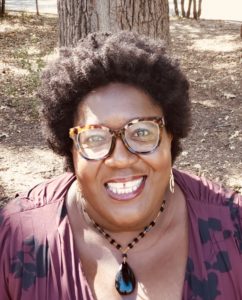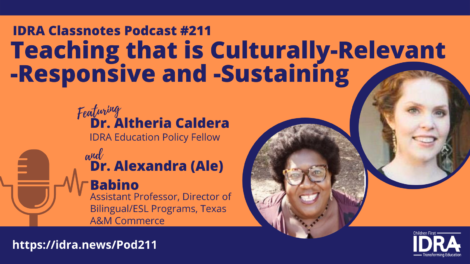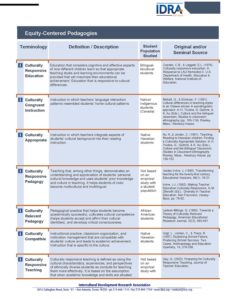 • Altheria Caldera, Ph.D. • IDRA Newsletter • May 2021 •
• Altheria Caldera, Ph.D. • IDRA Newsletter • May 2021 •
Throughout the decades, IDRA has used several equity-centered pedagogical terms to describe our work with ethnically and racially minoritized children and youth. Like others, we have used the terms culturally responsive, culturally relevant, and culturally sustaining somewhat interchangeably, for example, to convey a wide range of ideas relating to respecting and honoring students’ cultures.
But these terms are not synonymous. To explore the nuances of language, we considered: our own beliefs about the goals of education for students of color; our context and the distinct needs of the student populations we serve; and our existing advocacy and education work for students of color.
- Culturally responsive pedagogy refers to teaching that, among other things, demonstrates an understanding and appreciation of students’ personal cultural knowledge and uses students’ prior knowledge and culture in teaching.
- Culturally relevant pedagogy helps students become academically successful, cultivates cultural competence by helping students accept and affirm their cultural identities, and develops critical consciousness.
- Culturally sustaining pedagogy maintains heritage, values, cultural and linguistic pluralism. It has the explicit goal of sustaining and supporting bi-/multilingualism and multiculturalism.
The term culturally sustaining educational practices, as theorized by Paris & Alim (2017), best encapsulates IDRA’s vision for equitable schooling for students of color. Educational practices emphasizes the need to include curriculum, climate, programming and policies, rather than just teaching or pedagogies.
 First, we believe that educational practices in a democratic society should aim to cultivate cultural pluralism rather than to assimilate all students into one “American” culture. Next, we see the need for anti-colonial practices that disrupt the overwhelming whiteness that results in curricular and pedagogical violence against students of color. Last, we reject any efforts to divorce students from their home cultures to school culture (or encourage them to conform) so that they might achieve academically.
First, we believe that educational practices in a democratic society should aim to cultivate cultural pluralism rather than to assimilate all students into one “American” culture. Next, we see the need for anti-colonial practices that disrupt the overwhelming whiteness that results in curricular and pedagogical violence against students of color. Last, we reject any efforts to divorce students from their home cultures to school culture (or encourage them to conform) so that they might achieve academically.
When we use the term culturally sustaining educational practices, we are describing work that not only respects and honors but intentionally nurtures and expands ethnically and racially minoritized students’ cultures. These practices uplift, center, and sustain Black, Latino, Asian/Pacific Islander, and Indigenous (or Native peoples) cultures, which Paris & Alim (2017) described as “rich and innovative.”
 To ensure that students’ cultural heritage and histories are not lost, culturally sustaining practices perpetuate the historically devalued cultures of students of color. Evidence of this stance can be seen in IDRA’s work, such as to establish ethnic studies high school courses; to encourage education policies that center the needs of emergent bilingual students; and to support policies and practices aimed at eliminating discipline policies that disproportionately discriminate against Black students.
To ensure that students’ cultural heritage and histories are not lost, culturally sustaining practices perpetuate the historically devalued cultures of students of color. Evidence of this stance can be seen in IDRA’s work, such as to establish ethnic studies high school courses; to encourage education policies that center the needs of emergent bilingual students; and to support policies and practices aimed at eliminating discipline policies that disproportionately discriminate against Black students.
Paris & Alim outlined the goals of culturally sustaining pedagogy “to perpetuate and foster – to sustain – linguistic, literate and cultural pluralism.” This means teaching that counters the erasure and elimination of minoritized cultures that occurs through schooling in societies characterized by white dominance. They cautioned that sustaining cultures is ultimately about sustaining the lives of the people who practice them. (Paris & Alim, 2017)
Paris & Alim believe, as do we, that “equity and access can best be achieved by centering the dynamic practices and selves of students and communities of color in a critical, additive and expansive vision of schooling.” Practicing education from this stance helps to sustain the cultural wealth of groups whose cultures have been disparaged.
Resources
Paris, D., & Alim, S.H. (Eds.). (2017). Culturally Sustaining Pedagogies: Teaching and Learning for Justice in a Changing World. New York, N.Y.: Teachers College Press.
Altheria Caldera, Ph.D., is an IDRA Education Policy Fellow. Comments and questions may be directed to her via email at altheria.caldera@idra.org.
[©2021, IDRA. This article originally appeared in the May 2021 IDRA Newsletter by the Intercultural Development Research Association. Permission to reproduce this article is granted provided the article is reprinted in its entirety and proper credit is given to IDRA and the author.]


